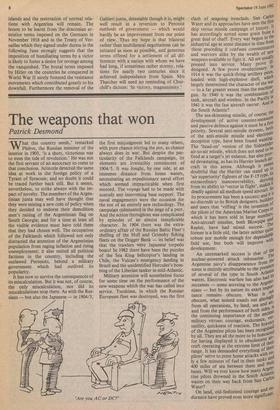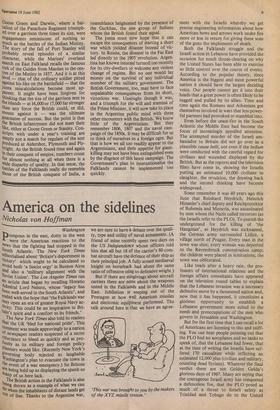The weapons that won
Patrick Desmond
`What this country needs,' remarked Plehve, the Russian minister of the interior in 1903, 'is a short, victorious war to stem the tide of revolution.' He was not the first servant of an autocracy to come to that conclusion. Aristotle detected the same idea at work in the foreign policy of a Tyrant of Syracuse; and no doubt it could be traced further back still. But it seems, nevertheless, to strike always with the im- pact of novelty. The members of the Argen- tinian junta may well have thought that they were mining a new coin of policy when they decided to endorse their demolition men's raising of the Argentinian flag on South Georgia; and for a time at least all the visible evidence must have told them that they had chosen well. The occupation of the Falklands which followed not only distracted the attention of the Argentinian population from raging inflation and rising unemployment; it also united all political factions in the country, including the outlawed Peronists, behind a military government which had outlived its popularity.
It has now to survive the consequences of its miscalculation. But it was not, of course, the only miscalculation, nor did its miscalculations stop there. As with the Rus- sians -- but also the Japanese — in 190415, the first misjudgment led to many others, with pure chance stirring the pot, as chance always does in war. But despite the par- ticularity of the Falklands campaign, its elements are irresistibly reminiscent of 1904/5. It was fought, by one side, at an immense distance from home waters, necessitating an expeditionary naval effort which seemed impracticable when first mooted. The voyage had to be made with scarcely any intervening base support. The naval engagements were the occasion for the test of an entirely new technology. The campaign culminated in the siege of a port. And the action throughout was complicated by episodes of an almost inexplicable character. In 1904 there was the extra- ordinary affair of the Russian Baltic Fleet's shelling of the Hull and Grimsby fishing fleets on the Dogger Bank — its belief was that the trawlers were Japanese torpedo boats! In 1982 there have been the puzzles of the Sea King helicopter's landing in Chile, the Vulcan's emergency landing in Brazil and the unidentified Hercules's bom- bing of the Liberian tanker in mid-Atlantic.
Military attention will nonetheless focus for some time on the performance of the new weapons which the war has called into service. Tsushima, in which the Russian European fleet was destroyed, was the first Are you AC or DC?'
clash of seagoing ironclads. San Carlos Water and its approaches have seen the first ship versus missile campaign of history. It has accordingly sorted some grain from a great deal of chaff. Every war begun in the industrial age at some distance in time from those preceding it confuses commentators and warriors alike by the wealth of new weapons available to fight it. All are usually pressed into service. Many prove 111' designed. A few prove revolutionary: In 1914 it was the quick-firing artillery loaded with high-explosive shell, wine" largely determined the character of the War — to a far greater extent than the machine- gun. In 1940 it was the combination 0, f tank, aircraft and wireless. In the Pacific in
1941 it was the fast aircraft carrier. And the South Atlantic?
The sea-skimming missile, of course; the development of active counter-measures and passive defence against it must be a rust priority. Several anti-missile systems, NIP, of the anti-missile missile and .electrnia' deception type, have been found wanting. The 'head-on' version of the Sidewinder air-to-air missile, which does not need to be fired at a target's jet exhaust, has also Pr°'• ed devastating, as has its Harrier launch air- craft in this arena. Although it seems doubtful that the Harrier can stand up t° `air superiority' fighters of the F-15 tyPe,.It,s extraordinary manoeuvrability, deriving from its ability to 'vector in flight', makes it deadly against all medium speed aircraft. So its procurement has been a success; and It Is no discredit to its British designers, builders,. and users that `viffing' is the invention °I the pilots of the American Marine CorPs to which it has been sold in large numbersci Anti-aircraft missiles, both Blowpipe arie Rapier, have had mixed success. I,' former is a little old, the latter neither quite robust nor mobile enough for dependabAe field use, but both will improve %On development. An unremarked success is that of1, hthee nuclear-powered attack submarine. 4 Argentine navy's disappearance from we scene is entirely attributable to the Preseric.c of several of the type in South Atlant.;s waters. Electronic warfare has also had ti, successes — some accruing to the Argen; mans — but by its nature its exact inIP° t tance remains obscure. What is ,,11°Iv obscure, what indeed stands out glarlu from all operations, by land, sea and air, s and from the performance of both sides' ic the continuing importance of the ancien_ military virtues: courage, endurance, ver satility, quickness of reaction. The bray.I of the Argentine pilots has been recognise,' by all. They are all the more to be honour. for having displayed it in obsolescent air._ craft operating at the extreme limit of the!ti. range. It has demanded everything of the,i, pilots' nerve to press home attacks with °'A ly a few minutes of fuel in their tanks art.", 400 miles of sea between them arid then
bases. Will we ever know how many Argen."c tine pilots drowned in the South Atlantis wastes on their way back from San Carlo Water?
On land, old-fashioned courage and en: durance have proved even more significant. Goose Green and Darwin, where a bat- talion of the Parachute Regiment triumph- ed over a garrison three times its size, were engagements reminiscent of nothing so much as the battles of the Indian Mutiny. The story of the fall of Port Stanley will Probably reveal episodes of a similar character, while the Marines' overland march on East Falkland recalls the famous trek of the Guides from Mardan to the cen- tres of the Mutiny in 1857. And it is at this level — that of the ordinary soldier pitted ,against his like on the battlefield — that the Junta miscalculations become most ap- parent. It might have been forgiven for thinking that the size of the garrison sent to the islands — at 16,000 or 17,000 far stronger than any force the British could, or did, Mount against it — was the ultimate guarantee of success. But the point is that the British infantrymen did not meet their like, either at Goose Green or Stanley. Con- se ripts with under a year's training are simply not a match for regulars of the sort Produced at Aldershot, Plymouth and Pir- bright. As the British found time and again In their conquest of empire, numbers count for almost nothing at all when there is a wide disparity of quality. In that sense, the battles of the Falklands really do resemble those of the British conquest of India, a
resemblance heightened by the presence of the Gurkhas, the one group of Indians whom the British found their equal.
The junta must now hope that it can escape the consequences of starting a short war which yielded disaster instead of vic- tory. In Russia, the disaster in the Far East led directly to the 1905' revolution. Argen- tina has known internal turmoil too recently for its city-dwellers to welcome any violent change of regime. But no one would lay money on the survival of any individual member of the military government. The British Government, too, may have to face unpalatable consequences from its short, victorious war. Unsought though it was, and a triumph for the will and stamina of the Prime Minister, it will now take its place in the Argentine public mind with three other encounters with the British. We know little of the Argentinians. But they remember 1806, 1807 and the naval cam- paign of the 1850s. It may be difficult for us to think of ourselves as a foreign ogre. But that is how we all too readily appear to the Argentinians, and their appetite for giant- killing may not have been extinguished even by the disgrace of this latest campaign. The Government's plan to internationalise the Falklands cannot be implemented too quickly.





































 Previous page
Previous page